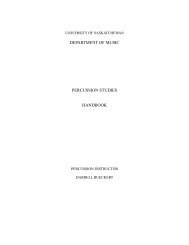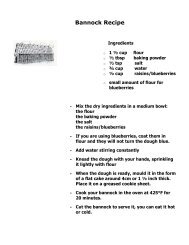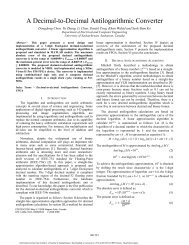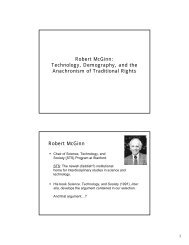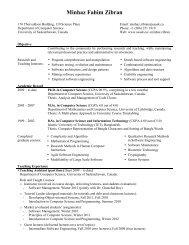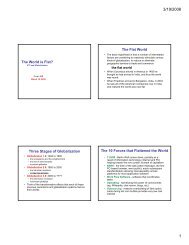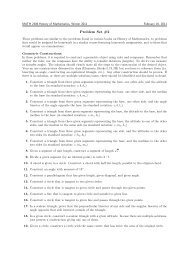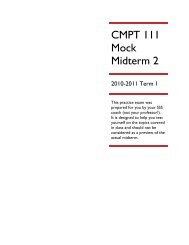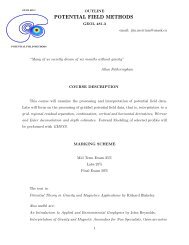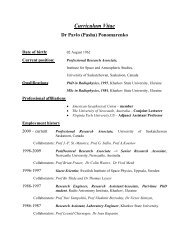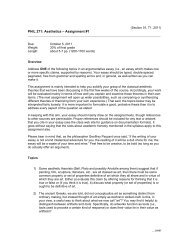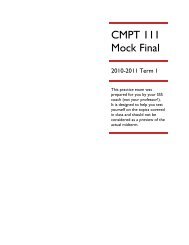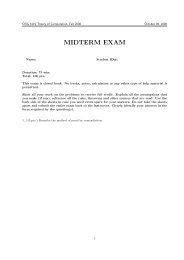Water Resources Engineering - Homepage Usask
Water Resources Engineering - Homepage Usask
Water Resources Engineering - Homepage Usask
You also want an ePaper? Increase the reach of your titles
YUMPU automatically turns print PDFs into web optimized ePapers that Google loves.
C2. MATHEMATICS FOR WATER ENGINEERING<br />
(KUL-code: HF38 (Th); HF39 (Pr))<br />
Lecturer: MONBALIU J.<br />
ECTS-credit: 5 pts<br />
Contact hours: 30 hrs. of theory/30 hrs. of practical<br />
Prerequisites: Basic knowledge of calculus, matrix algebra and numerical methods; use of a<br />
spreadsheet<br />
Time and place: 1st semester, 13 sessions of 3 hours each, K.U.Leuven<br />
Course syllabus: Lecture notes<br />
Evaluation: Quotation on sample problems and oral exam with written preparation<br />
Comparable handbook: C.R. Wylie & L.C. Barret. Advanced engineering mathematics. Mc Graw-Hill<br />
K. Arbenz & A. Wohlhauser. Advanced mathematics for practicing engineers. Artech<br />
House<br />
Lecture notes on computational hydraulics<br />
Additional information: Emphasis is on exercises (hand-on experience); many exercises need to be solved on<br />
computer (spreadsheet); students are introduced to the matlab software package for the<br />
solution of certain problems.<br />
Learning objectives:<br />
- become familiar with mathematical formulations in fluid flow problems<br />
- become familiar with some elementary numerical techniques for solving fluid flow problems<br />
- distinguish between ‘exact’ solution and numerical approximation<br />
- learn how to deal with different notations in different text books<br />
Mathematical models are commonplace and are widely used by engineers dealing with water resources.<br />
Knowledge of and critical insight in analytical and numerical techniques is however essential not only when<br />
one wants to use these models, but also for understanding and evaluating their outcome.<br />
Course description:<br />
The aim of the course is to introduce advanced mathematical techniques for analyzing fluid mechanics and for<br />
obtaining practical solutions for fluid flow problems. The course covers a selection from each of the three<br />
topics given below.<br />
1. Mathematical theory of fluid mechanics:<br />
- functions, vectors and tensors;<br />
- gradient, divergence and rotation operators; theorems of Green and Stokes; properties of irrotational,<br />
conservative and potential flow fields;<br />
- time derivatives; velocity and acceleration, material derivatives; particle paths, equipotential and<br />
streamlines;<br />
- coordinate systems and transformation rules; Jacobian and Hessian matrices.<br />
2. Partial differential equations for describing fluid dynamics:<br />
- characteristics and classification of differential equations;<br />
- properties of first order differential equations; solutions of kinematic wave equations and advection<br />
equations;<br />
- properties of 2nd order elliptic partial differential equations; Laplace and Poisson equations related to<br />
stationary flow problems; and<br />
- properties of 2nd order parabolic partial differential equations; diffusion problems, advection dispersion<br />
equations.<br />
3. Numerical techniques:<br />
- numerical solution of systems of linear equations; relaxation techniques and conjugate gradient methods;<br />
- numerical solution of nonlinear equations, and systems of nonlinear equations;<br />
- numerical techniques for interpolation, differentiation and integration; and<br />
- least squares fitting and optimization techniques.<br />
The practical work consists of a selection from:<br />
5 / Course syllabi



